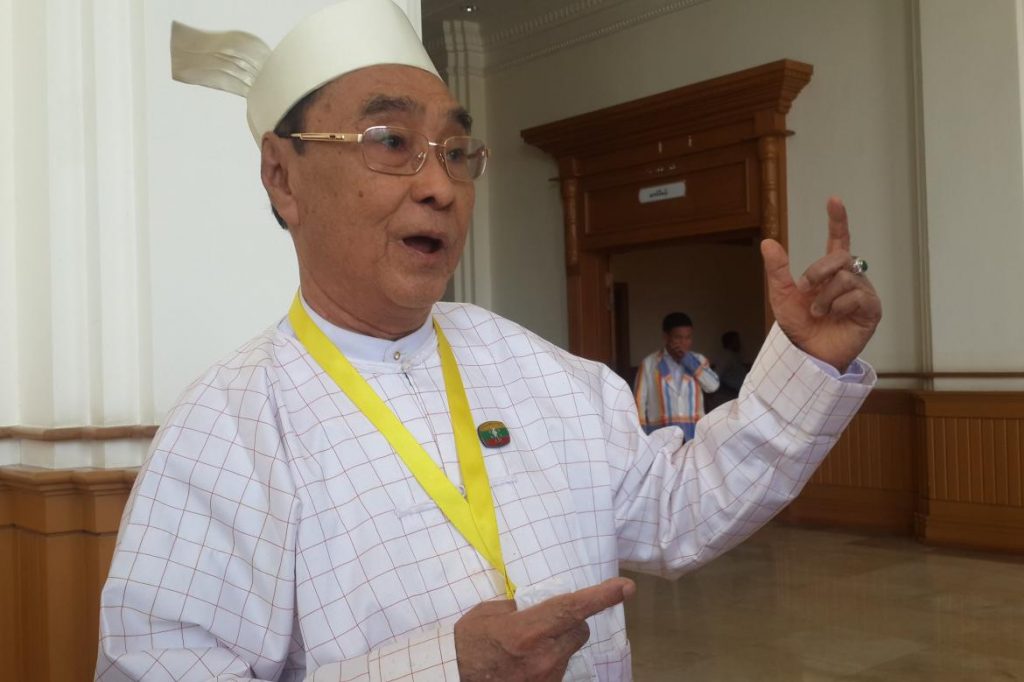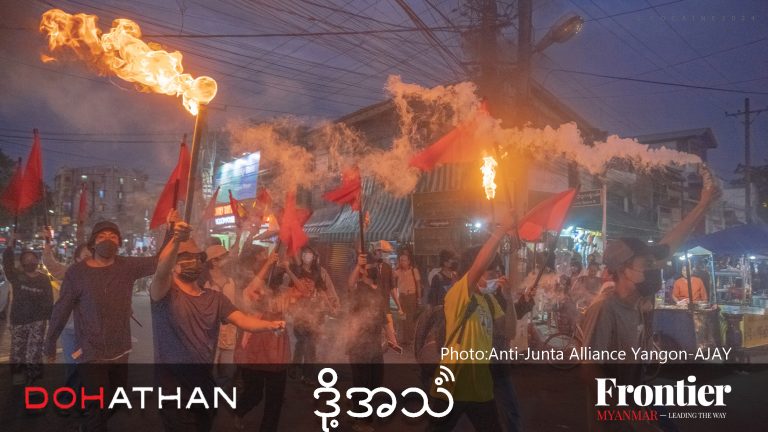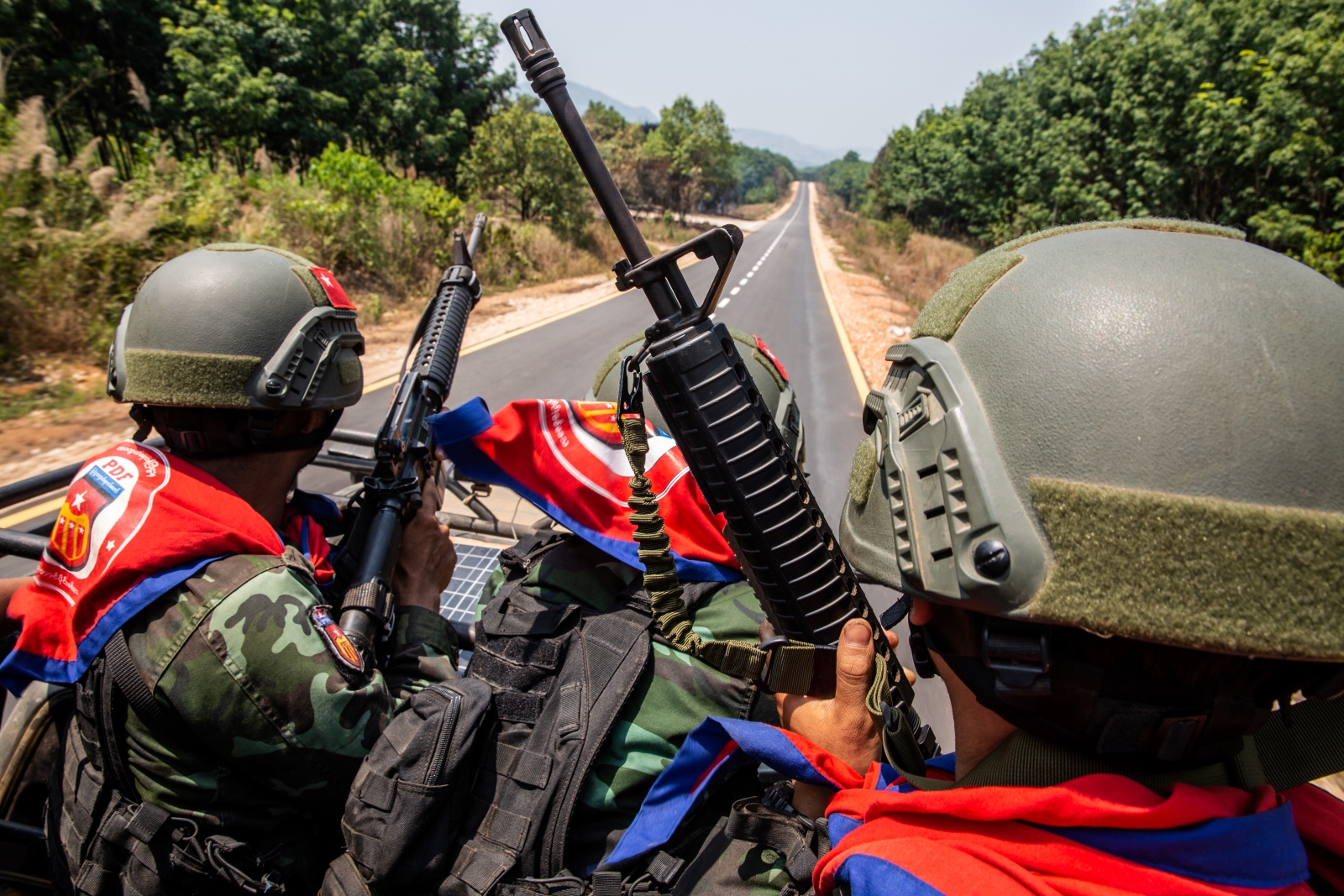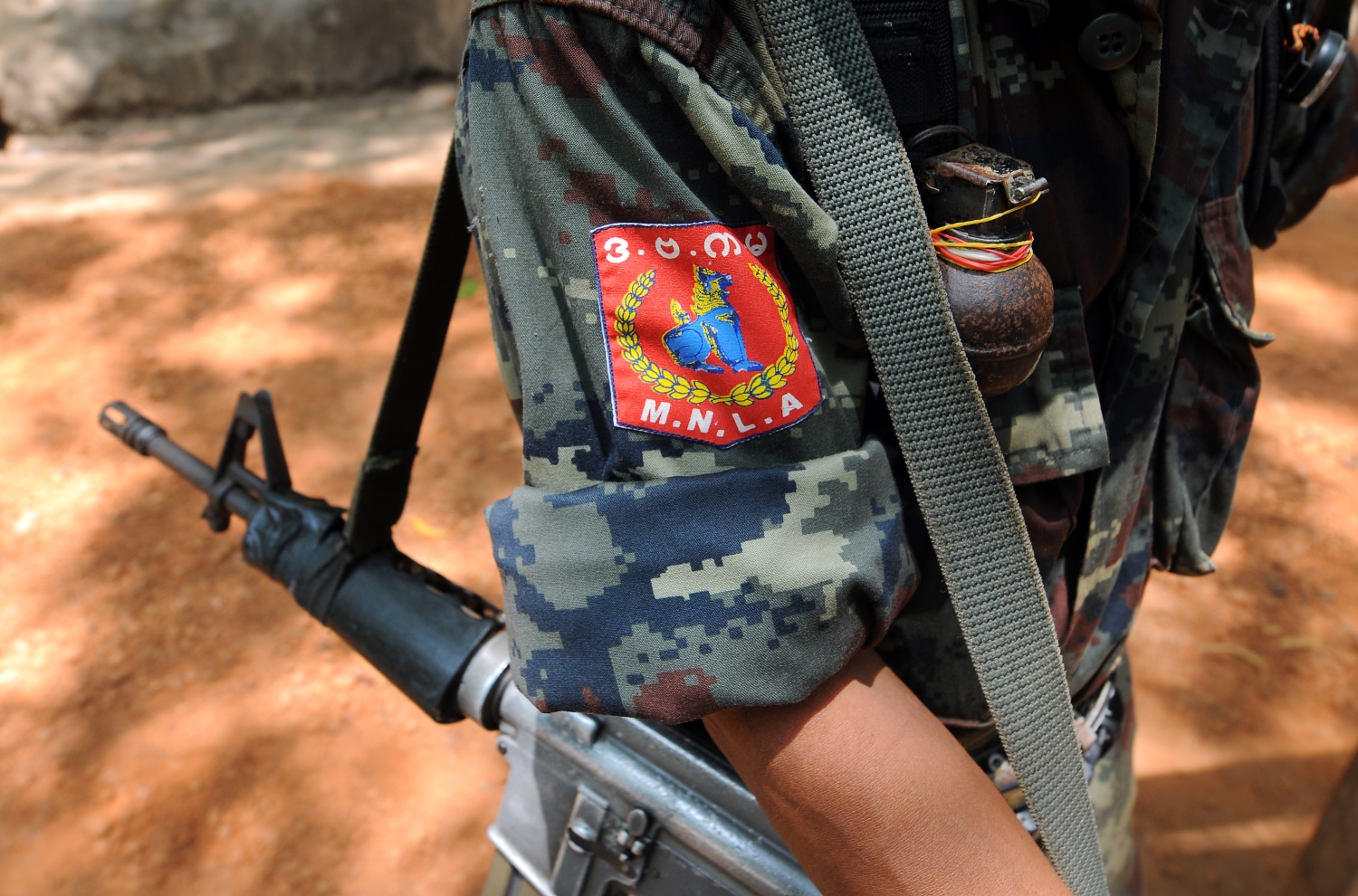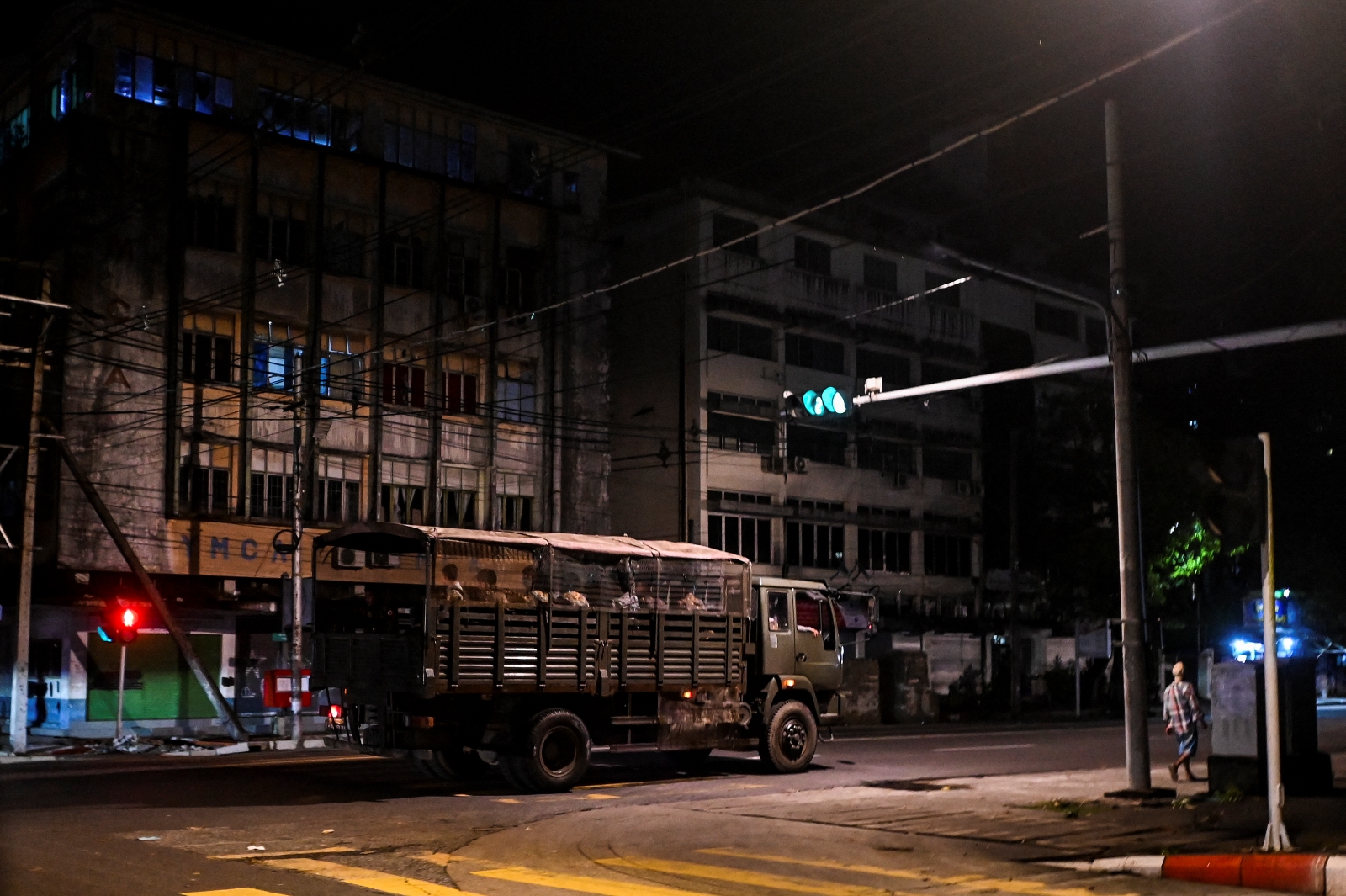The Ethnic Affairs Minister has criticised his lawmaker daughter for successfully proposing a Mon State bridge be named after Bogyoke Aung San.
By NYAN HLAING LYNN | FRONTIER
NAY PYI TAW — Minister for Ethnic Affairs Nai Thet Lwin has criticised his MP daughter, lawmaker Mi Kon Chan, for proposing to parliament that a bridge in Mon State be named after Bogyoke Aung San.
His comments come as thousands are expected to attend a protest in the Mon State capital Mawlamyine this weekend against the Pyithu Hluttaw’s decision to approve the proposal from Mi Kon Chan (National League for Democracy, Paung).
Thet Lwin told Frontier on the sidelines of the Hluttaw session on March 15 that the proposal could harm national unity and even “cause hatred” between ethnic groups.
“It’s very bad that the proposer is my daughter,” he said.
Support more independent journalism like this. Sign up to be a Frontier member.
But he also criticised the NLD more broadly, suggesting the party had fallen into a trap.
Using its might in parliament to settle the dispute was a “method of victory of the uninitiated” – those lacking in political experience or nous.
“People express their opinions when they gain semi-democracy. Politicians say something and those who want to exploit the situation say differently. A monk will say differently if you ask him. Historians will say differently if you ask them. A nationalist will say differently. Some people will say to name [the bridge] after Bogyoke Aung San. But it would be best if residents and the government were able to negotiate successfully.”
Large protest planned
The bridge, which spans the Thanlwin (Salween) River and links Mawlamyine with rural Chaungzon Township – better known as Bilu Kyun (Ogre Island) – was to be called the Thanlwin Bridge (Chaungzon).
But in February it was revealed that the bridge would instead be named after the country’s independence hero, prompting some ethnic Mon to accuse the National League for Democracy of “bullying” and ignoring the principles of federalism.
On February 2, about 3,000 people demonstrated against the decision, while Mon community leaders have also been lobbying Nay Pyi Taw over the issue.
One of the protest leaders, U Min Min Nwe, told Frontier that another – and likely larger – demonstration would be held on Mawlamyine’s Strand Road on March 19.

Pyithu Hluttaw MP Mi Kon Chan (NLD, Paung) speaks to reporters outside parliament this week. (Nyan Hlaing Lynn | Frontier)
He said the protest was needed because letters to State Counsellor Daw Aung San Suu Kyi, the speakers of the national parliament and Minister for Construction U Win Khaing had gone unheeded.
“We’ve objected to the name change but feel like we’ve been ignored. We expect tens of thousands of people to join the protest,” he said.
A 96-member committee, comprising representatives of all townships in Mon State and ethnic Mon communities elsewhere in the country, has been formed to lead the protest movement. They began distributing pamphlets yesterday urging all “patriotic ethnic Mon” to take part in the demonstration.
The committee plans to inform the authorities of its protest plans today, as required under the Right to Peaceful Assembly and Peaceful Procession Law.
U Min Min Nwe said the demonstration was not a politically motivated attack on the NLD or government. He said Mon people feel bullied by the sudden decision to change the name of the bridge.
Parliament backs name proposal
The first protest was held after Mi Kon Chan submitted a proposal to the lower house on February 28 calling for the bridge to be named after Bogyoke Aung San.
The proposal was approved by the Pyithu Hluttaw on March 14 after being discussed by 15 lawmakers and Minister for Construction U Win Khaing. The minister joined 12 representatives from the NLD in expressing support for the proposal. However, one Union Solidarity and Development Party lawmaker objected, while an MP from the Kachin State Democracy Party suggested asking local residents.
It was the first time the national parliament has considered the issue of naming a bridge since it was established in January 2011 as part of the transition from military to quasi-civilian rule.
Maj Zaw Zaw Moe, a military lawmaker, said the Tatmadaw was “neutral” on the issue, but also did not believe that it should be discussed in the Pyithu Hluttaw.
Some of the NLD lawmakers questioned the motives of those campaigning against naming the bridge after Bogyoke Aung San.
U Kyaw Aung Lwin (NLD, Sidoktaya) said lawmakers should not damage the “eternal dignity” of Aung San because of “some people’s instigation”.
U Myo Zaw Oo (NLD, Lewe) said that “Mon brothers and sisters” should take pride in naming the bridge after Aung San. “For ethnic Mon, it is an opportunity to repay their gratitude to Bogyoke Aung San,” he said.
But U Maung Myint, a Union Solidarity and Development Party lawmaker from Mingin Township, objected to the proposal, arguing that it was degrading to name “a small, ordinary bridge” after Bogyoke Aung San.
When Pyithu Hluttaw Speaker U Win Myint asked whether lawmakers agreed with the proposal, Maung Myint stood to show his dissent so electronic voting was used.
It was approved 217-43, with 116 lawmakers – mostly from the military – abstaining.
‘A dictatorial act’
After the session, Maung Myint said the decision went against the principles of democracy. “Democracy is a system that has to take into consideration the wishes of the citizens. Most residents oppose renaming the bridge … [so] it is like a dictatorial act if the bridge is renamed using the hluttaw’s power.”
But Mi Kon Chan defended the decision, saying the bridge was a significant piece of infrastructure worthy of the name of Bogyoke Aung San.
“It is not some village bridge. As the minister mentioned, it is a bridge built in order for all ethnic groups to reach an international standard of development. So we have to think about everyone. I want to make clear that it’s not about race,” she said.
Asked if she had discussed the issue with local residents protesting against the name, Mi Kon Chan said: “There are many different kinds of protests. What do you mean? Who are the local residents of Mon State? There are a variety of ethnic people live in Mon State.”
Min Min Nwe said Bilu Kyun residents were upset that no lawmakers had come to discuss the issue with them.
“The proposer is a Paung Township MP. She submitted the proposal without asking any local residents,” he said.
“They say they are on the road to a federal state, but they didn’t ask the desire of local residents when naming the bridge.”
The Chaungzon constituency is presently vacant because the representative elected in 2015, Daw Khin Htay Kywe from the NLD, was forced to resign after she was appointed to the Constitutional Tribunal.
Nai San Hlaing, a committee member of the Mon National Party, said the decision should have been resolved in the regional rather than national parliament.
“This shows that the government is not interested in federalism. The parliament does not listen to the people and it can affect the trust of the people in the central government.”
TOP PHOTO: Nai Thet Lwin, the Union Minister for Ethnic Affairs, in parliament on Wednesday. (Nyan Hlaing Lynn | Frontier)


